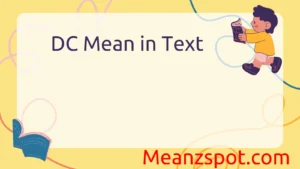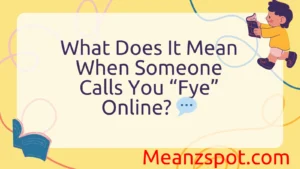If you’ve been texting or scrolling through social media lately, you’ve probably seen “FR” pop up in conversations—and maybe wondered, what does FR mean? This simple two-letter abbreviation is trending in 2025 and widely used across platforms like TikTok, Instagram, and Snapchat. But its meaning can vary depending on the context, so understanding it is key to keeping your digital conversations smooth and up-to-date.
In texting, “FR” most commonly stands for “for real”, a phrase used to emphasize honesty, agreement, or surprise. It’s a quick, casual way to say “I mean it” or “seriously.” But that’s not all—“FR” can also carry different vibes depending on tone and situation, making it a versatile piece of modern slang.
In this guide, we’ll break down the meaning, usage, and examples of “FR” so you can text confidently and join the trend without missing a beat.
Definitions & Meaning
At its core, “fr” is shorthand for “for real.” It’s a quick way to express sincerity, agreement, or emphasis without typing out the full phrase. Let’s look at some text-message examples:
- Expressing agreement: Friend A: “Those tacos were the best I’ve ever had.”
Friend B: “fr, I’m still dreaming about them!” - Seeking confirmation: You: “You’re coming tonight, fr?”
In each case, “fr” signals that the speaker isn’t joking around. It’s direct and conversational, suited to the rapid pace of texting. Unlike more formal language, “fr” strips out excess words and focuses on authenticity. You’ll also see it capitalized (“FR”) when someone wants to up the intensity, such as reacting to shocking news or a dramatic story.
Beyond “for real,” some users interpret “fr” as “frankly” in contexts where honesty is front-and-center. However, this usage is less widespread. If you’re unsure which meaning applies, pay attention to the conversation’s tone: if it’s about truth or seriousness, “for real” is almost always the intended phrase.
Origins & History
Abbreviations in texting trace back to early mobile phones, where typing was cumbersome and character limits applied. As SMS (Short Message Service) grew in popularity during the late 1990s and early 2000s, users began condensing words to save time. “For real” naturally shrank to “fr” because each letter captured the key sounds.
This trend accelerated with the rise of instant messaging platforms such as AOL Instant Messenger, MSN Messenger, and later, BlackBerry Messenger. Users sought ever-faster ways to communicate, breeding an entire lexicon of acronyms (LOL, OMG, BRB, and so on). “fr” quietly joined the ranks, but didn’t gain mainstream traction until social media apps like Twitter and Instagram, where brevity is prized.
By the mid-2010s, “fr” became a fixture among Gen Z and millennials. Its spread owes much to viral tweets and memes: once celebrities and influencers sprinkled “fr” into captions, millions of followers adopted it. The slang then hopped to TikTok and Snapchat, embedding itself in youth culture.
While technology drove “fr,” language evolution sealed its place. Like all slang, “fr” reflects the desire for speed, style, and solidarity. It’s a bridge between generations—grandparents may still type “for real,” but younger texters prefer “fr.”
Usage in Different Contexts
“fr” thrives in various contexts, each lending a slightly different shade of meaning:
- Social Media:
- Casual endorsement: “This new track slaps, fr.”
- Surprised reaction: “You got front-row seats? fr??”
- Professional Messaging (informal workplaces):
Some tech startups or creative agencies allow relaxed tone over Slack or Teams. Here, “fr” can signal genuine agreement without breaking the flow: “That design looks sleek, fr.” - Pop Culture & Entertainment:
Online fan communities use “fr” to underscore passion: “Taylor’s new album is genius, fr.” - Group Chats:
In friend circles or family groups, “fr” might emphasize honesty or playfully call someone out: “You really finished the whole pizza by yourself? fr?” - Cross-Platform Conversations:
You might see “fr” in video captions, comment sections, or even email footers in casual threads. Its brevity makes it versatile across media.
Despite its versatility, “fr” remains inherently informal. Avoid using it in formal emails, academic writing, or professional proposals. When in doubt, stick to “for real” in full to maintain clarity and formality.
Common Misunderstandings & Clarifications
Because “fr” looks simple, it’s easy to misread or misuse. Here are some pitfalls:
- Confusing with “Friday” (“Fri”):
In calendar invites or emails, “Fri” always means “Friday.” If you reply “fr” in response to “Plans this Fri?”, you risk sounding like you’re saying “for real” instead of confirming the day. - Interpreting as “frankly”:
In formal prose, “fr.” with a period might abbreviate “frankly,” but in texting, “fr” without punctuation almost always means “for real.” - Assuming sarcasm:
Tone can flip “fr” into sarcasm. “You aced that test without studying? fr…”
The trailing ellipsis can convey disbelief rather than sincerity. Pay attention to punctuation and context. - Overusing it:
Leaning too heavily on “fr” can dilute its impact. Sprinkle it in where you want to stress honesty or agreement—but don’t let it replace all your adjectives and verbs!
Alternatives & Synonyms
If “fr” feels overplayed or you need variety, consider these options:
- “For sure” (fs): Similar emphasis, slightly more upbeat. “That party was lit, fs.”
- “Seriously” (srsly): Conveys disbelief or urgency. “You finished in one hour, srsly?”
- “No cap”: Slang for “no lie,” popular in hip-hop culture. “That movie was amazing, no cap.”
- Full phrase “for real”: Always safe in formal and informal settings. “I love that art piece, for real.”
- “Honestly” (hon): Focuses on truthfulness. “Hon, that advice really helped me.”
Each alternative has its own flair, so pick the one that matches your style and audience.
Frequently Asked Questions (FAQ)
- What does “fr” stand for in texting?
“fr” stands for “for real,” used to express agreement or sincerity. - Is “FR” different from “fr”?
Capitalizing both letters (“FR”) can add extra emphasis or excitement. - Can I use “fr” in professional emails?
It’s best reserved for informal chats; opt for “for real” in professional contexts. - Does “fr” ever mean “Friday”?
No—use “Fri” for the day of the week to avoid confusion. - Is “fr” appropriate on social media captions?
Absolutely—its brevity and authenticity make it popular online. - How is “fr” punctuated?
Typically without punctuation; adding “?” or “!” shifts its tone (e.g., “fr?” asks for confirmation). - What’s a synonym for “fr”?
Try “no cap,” “for sure,” or “seriously” depending on your vibe.
Conclusion
Understanding “fr” transforms two small letters into a powerful expression. From its SMS origins to its dominance on TikTok and Twitter, “fr” captures authenticity and immediacy in our digital chats.
By recognizing its meaning, history, and varied uses, you’ll communicate more clearly—whether you’re affirming a friend’s opinion, questioning a statement, or simply keeping a conversation real. Next time you see “fr,” you’ll know it’s a nod to honesty and genuine emotion, not just another fleeting trend. Keep it in your texting toolkit, use it wisely, and watch how those two letters can amplify your voice.



